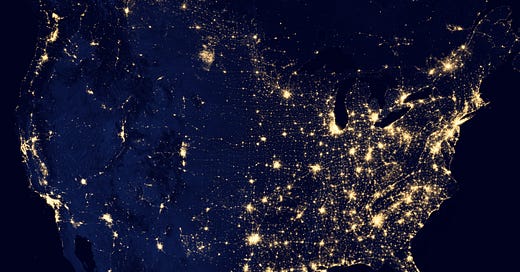I wonder how many of these sentiments feel familiar?
I don’t trust mainstream media.
I love my church, but we’re sort of outsiders there.
I’m conservative/progressive but don’t align with the Republican/Democratic party.
I like the people I work with, but I’m not totally on board with the company as a whole.
College isn’t worth the cost, but it would be a mistake not to go.
I view them as my true neighbors, but not in my backyard.
It seems to me that one of the truest things that we can say about our culture is that many of us feel like we don’t quite fit in. Sure, there are pockets where we feel more free, but I can’t think of a single person I know who feels at home with what might be described as “mainstream” culture in any sense of the word.
Cultural disaffection is a phenomenon worth thinking about.
My almost-13-year-old son might be the only exception I know. He loves pop music, loves to watch the news (any news), loves to be at the mall to hear the music, to see what’s happening in the shops, to be in the mix. He’s quick to accept the opinion of the loudest and most attractive voice. And according to him, if most people are doing it, then it’s probably the best thing to do. He has an appreciation for mainstream culture because he wants to be part of what people are doing. Call it an adolescent cultural FOMO. But he’s 12. He’s un-jaded and curious. And, most importantly, he seems to view mainstream culture as the medium for connecting with people.
And that’s how culture should work. It should be the medium that connects us with people in meaningful ways.
There countless definitions of “culture.” The main point of disagreement among them is whether culture is an identifiable whole or instead a constantly moving target, a term we use for shorthand but that lacks substance when interrogated. I could understand the person who thinks that those who are preoccupied with the tides and swings of a society’s media, political debates, and fashions are reacting to a monster under the bed.
But “culture” is most certainly real, even if it is difficult to define.
Charles Taylor begins his influential book from 2008, A Secular Age, by asking a direct question about how we got to where we are. How is it that we changed “from a society in which it was virtually impossible not to believe in God, to one in which faith, even for the staunchest believer, is one human possibility among others.” Belief in God was nearly impossible in the Christian middle ages, for instance, not because the evidence for God’s existence was so overwhelming to an individual seeker but because it was woven into the fabric of culture and thought. It was “axiomatic.” The conceptual vocabulary for atheism simply did not exist. One would need to have lived in a different world. And by “world,” I mean that one would have had to live in a society whose language, educational systems, economy, religious devotion, aesthetic tastes, and everyday habits created the conditions of thought where a worldview like atheism would have meaning.
That is the power of culture. It isn’t some conspiratorial matrix that controls our minds but an organic sum of our thoughts, beliefs, behaviors, social structures, priorities, and tastes. In essence, culture is what gives us as individuals meaning within a greater whole — our family, our society, our tradition, our nation, our world. The oldest definition of culture describes it as a “complex” of “capabilities.”
We experience culture as a power to do or not to do, to act or not to act.
And so, I suggest, if it is true that many of us feel out of sync with our culture, then we’re worse off than we might think because we’ve lost our place in the whole without realizing it. We’re less capable, less free, to act upon what we believe and value.
I appreciate Andy Crouch’s description of culture in Culture Making. He calls culture “the horizons of the possible.” Culture is the network of behaviors, beliefs, institutions, common notions, accepted definitions, norms, and aesthetics that makes some things easier for us to do or think than other things.
For example, two of my children attend a charter school, and I serve on school’s Board of Directors. We live in a county that predominantly values and prioritizes traditional public schools. Sometimes I experience direct criticism for our involvement at the charter school from public school teachers or people invested in the school district who say that our school is taking funds away from the at-risk students who need it most. I’ve been trolled on social media for my involvement. But that sort of direct criticism doesn’t bother me much. In fact, I appreciate a real conversation about a complex issue like the allocation of public funds for education. What does bother me, though, are the strictures that make governing and sending my children to a charter school more difficult. This affects our budget, as we only receive about half of the public funds per student as do traditional public schools. This affects our campus, as the district where the school is located has made it excessively difficult for us to expand — not just at the policy level but in the influence that lots of individuals can have collectively. If I’m in mixed company and parents are talking about the schools they attend, it is, in fact, easier for a parent at a traditional public school to sing the praises of their education than it is for me to. Not that I don’t, but if I do I should realistically expect a stink eye or two.
Our charter school is counter cultural, and we experience this by having less power to educate our children than do folks in traditional public schools. What counts as “mainstream” culture can be identified through the actions and decisions that are easier to make than others — what kinds of books are easier to publish, what kinds of things are more acceptable to say in public settings, what sort of clothes will incidentally grant you better customer service, what vocabulary signals to others that you are in the know.
Mainstream culture is an adaptive system of empowerment. Therefore it is all the more alarming that so many of us suffer from cultural disaffection.
We feel out of sync with culture. That means that our culture is such that some large portion of us (I would venture to guess the majority of us) find it difficult to do the things and live the way that we want to, or at least more difficult than we perceive the experience of somebody aligned with mainstream culture to be.
What causes cultural disaffection? Lots of things.
It could be a problem in those of us who feel like outsiders to mainstream culture. For instance, we could legitimately be maladjusted, as people used to say. And really, that’s just another way of saying that we ourselves lack power, that we lack ability to choose and do. Aristotle called this incontinence. I see this cause in action at churches. It’s a kind of deferral to other people to carry the banner.
But cultural disaffection could also be caused by culture itself. The hypothesis would be that if a large portion of a population feels out of sync with their culture, then there is probably something wrong with culture. What does that mean? Isn’t culture organic and composed of a countless number of overlapping circles, each one representing a sphere of activity and belief?
I’m confident that some readers will blame culture in another way, insisting that it’s controlled by a subsection of society that has more power than it ought to have — for instance, the media, or those who align with the trendy ideology. That may be true, but it doesn’t explain everything. If mainstream culture were controlled by a relative few who happened to stand up on the right wave, then we have to ask what’s wrong with our culture such that this imbalance can occur?
To better understand why cultural disaffection is so widespread and how our culture is broken, we need to look to the past. Stay tuned for my next post for more.




